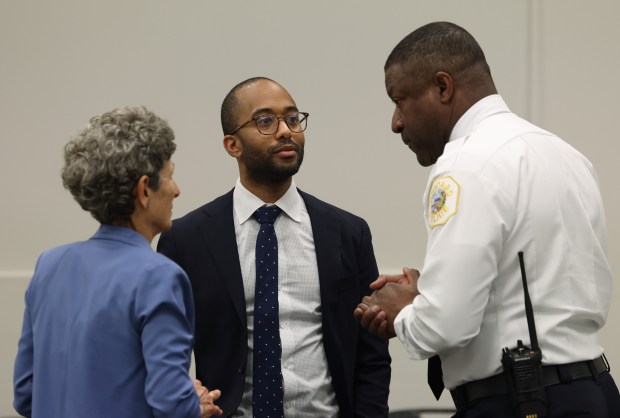For the second time this year, the majority of serious Chicago police misconduct cases are on hold as attorneys for the rank-and-file CPD officers’ union prepare to submit a challenge to a Cook County judge’s order that mandated those hearings be publicly accessible.
There are 19 pending cases currently before the Chicago Police Board, the body that’s meted out discipline in the most serious cases for six decades. But as of early July, at least 16 of those cases are halted because the city and union have yet to agree on a new structure for the yet-to-be-held arbitration hearings.
Last March, Cook County Judge Michael Mullen ruled that Chicago Police Department officers accused of serious misconduct may have their disciplinary cases adjudicated by a third-party arbitrator or the Chicago Police Board. Mullen also ruled that officers facing the most serious disciplinary charges — those that call for an officer to be fired or suspended for at least a year — be placed on inactive, no-pay status.
“The restriction of public access to arbitrations for serious police discipline is a direct contravention of the well-defined and dominant public policy of accountability and transparency of the government services in general and the Chicago Police Department specifically,” Mullen said in his order.
Now, though, 16 of the 19 officers currently facing disciplinary charges have signaled that they want an arbitrator to decide their cases instead of the Police Board, records show. But those cases can’t yet be heard or decided because, according to the Police Board, the city and the Fraternal Order of Police have yet to agree on a policy for the arbitration proceedings that would allow for public access — one of the main provisions in Mullen’s March ruling that the FOP is seeking to reverse.
The administrative charges against the 16 officers stem from allegations of improper use of deadly force, off-duty domestic violence incidents, verbal abuse, violations of the city’s COVID-19 vaccine policy, improper search and seizure, and one allegation of illegal drug use, records show.
Of those 16 officers, 11 are inactive and on no-pay status, according to a CPD spokesperson. Three others are assigned to the department’s Alternate Response Section, another to the Public Transportation Section and one more to the Gresham District on the South Side.
Attorneys for the FOP declined to comment ahead of their brief’s submission to the Appellate Court. Kyle Cooper, president of the Police Board, said during the board’s meeting last month that the FOP’s brief will be filed in mid-July. A spokesperson for the city’s Law Department did not provide a response when asked about the status of negotiations with the FOP on arbitration proceedings.
It was during that same meeting that Cooper also announced two board decisions in cases not subject to Mullen’s March order. In one decision, the board approved a settlement between CPD and an officer the department had previously sought to fire. Instead of being fired, the officer will serve a one-year suspension. The board also rejected the same settlement terms in a different case, calling for that officer to be separated from the department.
The pause on most Police Board proceedings — the second so far this year — does not apply to cases that involve CPD sergeants and other supervisors because those officers are not covered by the FOP’s collective bargaining agreement.
The dispute over serious police discipline stems from contract negotiations between the city and the FOP during summer 2023.
The neutral chair overseeing those talks, Edwin Benn, issued an award to the union that granted officers accused of serious misconduct a choice in how their cases would be adjudicated. As public sector employees represented by a collective bargaining unit, Benn said, CPD officers have the right to have misconduct cases decided by a third party outside of public view.
In December, Mayor Brandon Johnson opted to split the tentative contract proposal into two votes. The first — described as the “economic package” — was approved by the City Council and provided CPD officers with a 20% raise over four years, while also creating a new disciplinary mechanism — the “People’s Court” — to more quickly adjudicate minor misconduct cases. Those hearings are not documented by a court reporter.
The CPD and Community Commission for Public Safety and Accountability announced in May plans to bolster public access to the Police Department’s Internal Affairs files. The department’s Accountability Dashboard currently allows searches by internal affairs case number, but the CPD will soon expand the dashboard to let members of the public query by an officer’s name or badge number.
“We need to explain what good, constitutional policing looks like. We need to be clear and open when we get it right and when we get it wrong,” CPD Superintendent Larry Snelling previously said in a statement. “And when someone makes a complaint about one of our officers, they deserve to know how that case got resolved. Transparency benefits everyone and makes us a better department.”



